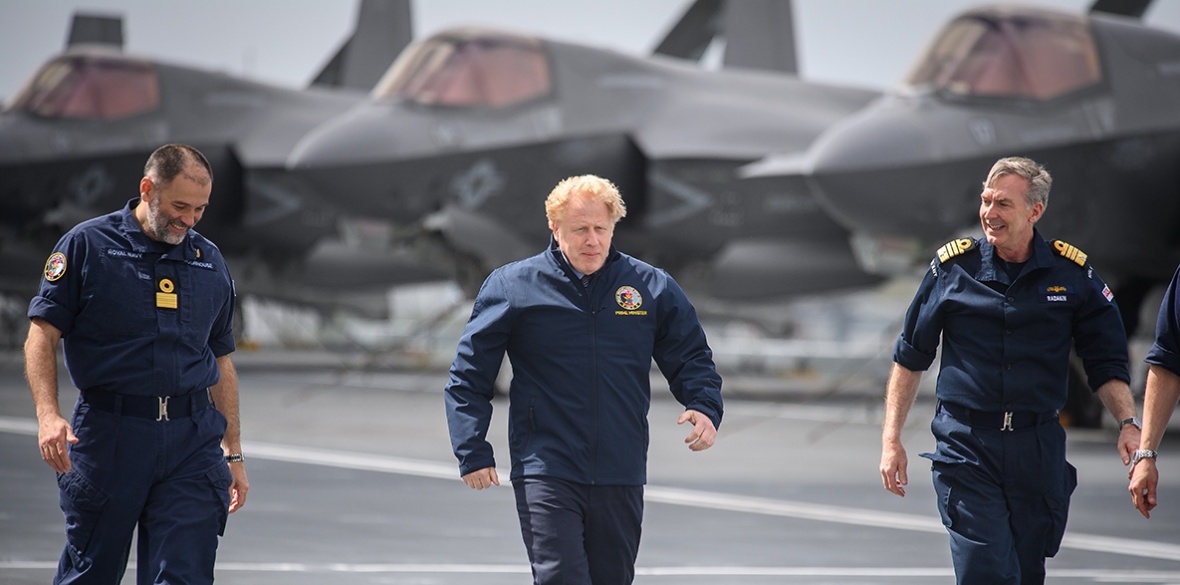BBC coverage of the departure of Britain’s new aircraft carrier from Portsmouth at the weekend epitomises many of the things that are wrong about our society, British government policies and television news reporting.
The Royal Navy’s new flagship HMS Queen Elizabeth embarked on its 26,000-mile journey to the Pacific as part of the so-called Carrier Strike Group of seven US and British warships and a submarine.
The majority of the military jets on board the aircraft carrier are American, accompanied by 250 US marines.
The BBC report broadcast throughout the day today was upbeat, reassuring … and a stinking load of codswallop, served up to mislead the viewers.
As an exercise in presenting the world-view of the British ruling class, on the other hand, it was sheer textbook.
First, no mention was made of the cost of Britain’s biggest-ever warship. When plans were first announced by the New Labour government in 2007, the budget was £4 billion for two carriers. By completion the expense had soared to more than £6bn.
That’s an overspend worth five or six new hospitals.
Instead, we were shown the other Queen Elizabeth bidding farewell to her namesake and its crew, demonstrating yet again how the monarchy is used to validate and “humanise” military power and its escalation.
After quoting the Royal Navy’s description of the CSG expedition as the “most powerful UK maritime deployment in a generation and the embodiment of global Britain,” the BBC report then featured Admiral Tony Radakin with the first dish of tripe.
Britain’s First Sea Lord told viewers: “This is a tangible expression of how the country can go out into the world. And so we have a fantastic new capability and when we deploy, it speaks to our values, our interests, what we stand for.”
Then we are fed the British government’s claim that the preponderance of US fighter jets aboard Her Majesty’s ship is a sign of British strength not weakness. That those jets will go into military action over Iraq when the fleet reaches the Mediterranean is skated over swiftly.
No mention is made of the carrier’s planned visit to oil-rich Oman, where British forces fought a secret war in the 1960s and ’70s to prop up a brutal and corrupt royal dictatorship against left-wing and nationalist rebels.
No doubt we were defending those good old British values, as Admiral Radakin might have put it.
The BBC reporter then informs us that as the Queen Elizabeth heads towards the Pacific, the British government insists that it’s not seeking a confrontation with China.
“This is more about boosting trade and a diplomatic ties in the region,” we are assured with a straight face.
Does this deployment signify a big shift in British foreign policy, a “tilt towards Asia”?
Cue smooth-voiced Lord Peter Ricketts, former national security adviser, to tell us that this is merely diplomacy as a “great piece of theatre” — the carrier delivered way overbudget and overtime is an “impressive piece of British engineering” and making it to the Indo-Pacific and back is a “gesture” rather than a strategic shift.
Yet again, not a dissenting voice is to be heard.
Should a fleet of seven Chinese and Russian warships, jet fighters and marines arrive in the North Sea, having launched military strikes along the way, one wonders how Britain’s political, military and media Establishment would react to the claim that this is not about confrontation; it’s merely a “theatrical gesture” to boost trade and diplomatic ties with, say, Norway, Sweden and Iceland.










